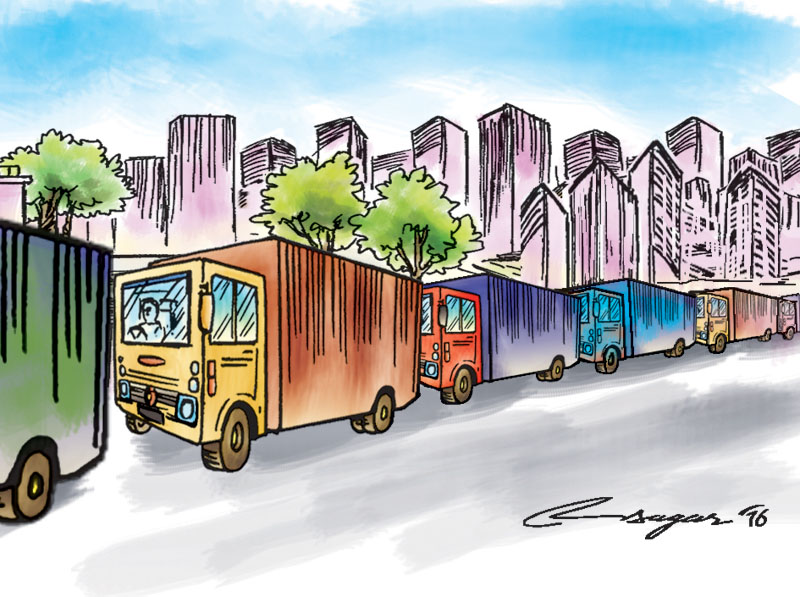Let Nepal be Nepal: Explore all avenues
Nepal has lost some of the glue of affinity and solidarity that has held it together for so long. It is a problem we created and the solution also must come from us. If we fail, others will continue to take undue advantage
These days I understand Nepal less and less. I am taken aback by the chaos of it all. Despite the country facing two unfortunate disasters, one nature made, the other man made, Nepalis did manage to squeeze out a much awaited new constitution albeit with some confusion and clarity, few hassles and hazards and mixed happiness but definitely with some hope, as it presently seems.
Call it our resilience, we seem to somehow survive silently, be it good or bad. Perhaps Nepalis’ spirit and will to survive is measured by the fact that the future is not what happens to us, but what we make of it. We face challenges at home and abroad that requires the hands, hearts and brains of every one of us to work together. Facing any adverse challenges Nepal has always used its best arsenal available to her – patience and unity as currently displayed in the present crisis.
A prolonged neglect of any section of the society will in some opportune time raise its ugly head, creating an extreme situation, this time in the form of Madhesi unrest. Truth be told, down decades it is quite depressing to note that our political establishments have always side-stepped the genuine demands of the Madhesis and other marginalized groups. There is no gainsaying that all legitimate Madhesi demands must be adhered to.
However, our rulers must be well cautioned and refrain from giving in to those demands that disturb Nepal’s historical sovereign entity, freedom and independence, which is considerably longer than that of our southern neighbour. The Madhesi leaders are to be applauded if they can realize their legitimate rights, keeping the cardinal fact in mind that they are Nepalis first and whatever else thereafter.
Months of agitation and a de facto economic blockade imposed by India has not only severely disturbed the harmony of our religious festivities; but the suffering has intensified further with the onset of harsh winter due to lack of gas/petrol/diesel especially for those poor villagers in the mountainous regions facing the brunt of the harsh winter weather after the devastating earthquake. This is pushing the nation to a state of failure. This coupled with contradictory interests of the Madhesi Morcha leaders and the inability of the ruling class to realize that at the heart of this uprising lie the real perceived elimination of the Madhesis and the marginalized groups in the new constitution. In the prevailing critically chaotic conditions, Nepal has lost some of the glue of affinity and solidarity that has held it together for so long. It is a problem we created and the solution also must come from us. If we fail, others will continue to fish in dirty waters. If we are to prevent the nation from disintegration, we have to first change the way we govern ourselves.
After the 11th hour of pressure tactics to delay the unveiling of Nepal’s constitution failed, India said it only took “note” of the new constitution which was passed by over a two-thirds majority in the parliament that was generally welcomed around the world. Showing its displeasure at Nepal’s new constitution and using the ongoing Terai turmoil as a façade and, despite UN’s serious concern about the blockade underlying Nepal’s right to free transit, India conveniently put in place its unofficial blockade flouting all international norms that gives a small nation the rights to its survival. New Delhi’s hands received great solace from the Madhes-based India-centric political parties which are currently taking the responsibility for the blockade which has led to humanitarian crisis.
Months of unofficial blockade which India denies and blames as being the outcome of an ongoing agitation on the Nepali side of the border, has now resulted in being a human crisis. Today, the people on both sides of the border baffled by the prevailing impasse are now beginning to ask the question whether there are any hidden agendas and issues connected to this chaotic and dangerous situation, possibly pushing Nepal in breaking a delicately balanced ethnic harmony. Political pundits on both sides of the border are of the opinion that India could have committed a strategic folly in its dealings with Nepal. Nepal realises the fact that it cannot choose its neighbours. As such, for her, India is a stark reality. As a big country and, especially as a neighbour, India need not corner a small nation like Nepal in giving in to all its demands. Nepal will need to relentlessly engage in discourse with India to seek a solution from the present standoff. Till today India insists there is no blockade and the obstruction in the flow of trade and commerce are results of agitation of the Madhesi Morcha.
However, there is a slight difference between a good and true reason; the good reasons for India’s unofficial blockade are for its security reasons along the border, while the true reason is to show India’s displeasure with Nepal’s new constitution. As Buddha said, “Three things cannot be long hidden—the sun, the moon and the truth.” It baffles the Nepalese sentiments as to why India as our closest neighbour tied all along with centuries old traditions should be irked by the new constitution written by Nepalis, for the Nepalis. In this hour of critical crisis, any nation for its survival will look to all possible avenues to diversify trade with other nations, to become self-reliant and not be dependent on a single nation. Even this is not quite welcome to India.






